On top of the side effects of chemotherapy, there can be complications. The complications of chemotherapy can be both intense and unpleasant. Not everyone has them, and they’re best avoided. Unfortunately, I was unable to avoid all of them.
When I started my chemotherapy treatments, it was explained to me that the calculation for the amount of chemotherapy you’re given is based on the surface area of your body. As I’ve mentioned previously, there are some established concerns about this method of working out the dose.
A lot of this research looks at the problem of under-dosing. If a patient is under-dosed, then they may well not be getting enough medication to offer an effective treatment. Under-dosing, though, was not my immediate problem.
I naturally tend towards the mesomorph (muscular) body shape. On top of that, I’m something of an endomorph (fat). This, typically, makes me big and heavy, but oddly fit. It also means that people think I weigh less than I do and that the BMI model doesn’t work for me. BMI calculators say my healthy weight should be between 10 stone and 13 stone 8 pounds. 10 stone? Please!
I mention all this because, as it turns out, my height and weight suggested a surface area that needed 3 bags of Oxaliplatin. 3 bags, as I would learn on my second visit, was 1 bag too many. Certainly at the rate it was being infused.
After my first Oxaliplatin treatment, I walked out of the treatment area feeling largely fine. This feeling was quickly eroded by 14 days of Capecitabine tablets. But, when I returned for my second dose, I’d had a week off since the last tablet, and was feeling quite chipper. I’d actually been looking forward to it because, although the Capecitabine tablets made me feel nauseous, they were very good at sending me to sleep. During my rest week, my standard levels of insomnia had crept back. I figured the return of the chemotherapy meant the return of sleeping well at night. And, to be fair, it would.
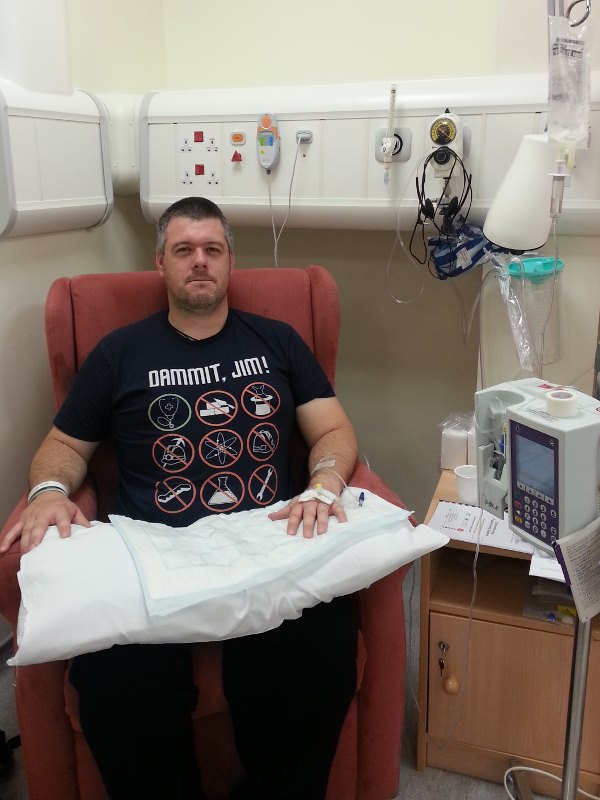
But first I had to receive my 3 bags of intravenous Oxaliplatin. Last time, my first time, I was in a side room on my own. This time I was in a room with 6 chairs. I grabbed one in a far corner and settled down for the procedure. I was told that it’d be the same as before. Receive the chemotherapy. Have the flush, to clear the last of the chemo out of the lines. Wait 10 minutes, in case there’s a reaction. Go home.
And away we went. It was an afternoon session, so I was due to finish about 5pm. At 4.45pm, I knew something was wrong. A thought occurred to me, so I asked the nurse, who was taking down the flush, what was meant by a ‘reaction’. And, as she fiddled with the drip, she absentmindedly explained that one of the complications of chemotherapy is a reaction to the medication. Then she paused, turned to me, looked me up and down and asked why I was asking.
I responded by asking for a sick bowl. She immediately ran off to get one, so I imagine I can’t have looked pretty. Even by my standards. She only just made it back in time for me to fill it. She only just got back with the next one, before I started filling that one, too. After that, she brought over a stack of sick bowls and disappeared.
It turned out that under-dosing isn’t the only problem with surface area based calculations. One of the complications of chemotherapy, is an overdose. The ‘reaction’ they had warned me about was what would happen if I got an overdose…
Poor Julie was then left trying to find places to put each bowl, as I filled the next. By the end of the third bowl, I’d got rid of everything I’d ever eaten in my life. All the bowls after that, and there were more than a dozen, were only for bile.
The human body is pretty well attuned, as far as these things go. My body knew that I’d been poisoned, so it was trying to get rid of the poison. My body knew that the only way for poison to get into me is if I eat or drink it. So it knew it had to empty my stomach. Having done that, my body was still finding poison in my system and, unfortunately, hadn’t heard about IV lines. So it decided to make me vomit increasingly harder and with increasing frequency.
I strongly disagreed with my stomach on this matter but it wasn’t listening. The vomiting went on for 5 hours.
My immediate problem, however, was that it was the end of the day and no one seemed to know what to do with me. In the end, a senior nurse, from one of the other rooms, was able to come over and give me an injection of cyclizine. This didn’t help at all. She was also able to tell me that a porter had been sent for but he was taking ages because he had to find the oversize wheelchair. The oversize wheelchair! How very dare they? But I wasn’t in a position to argue; I was barely in a position to breath. Besides, you can’t fight Health and Safety.
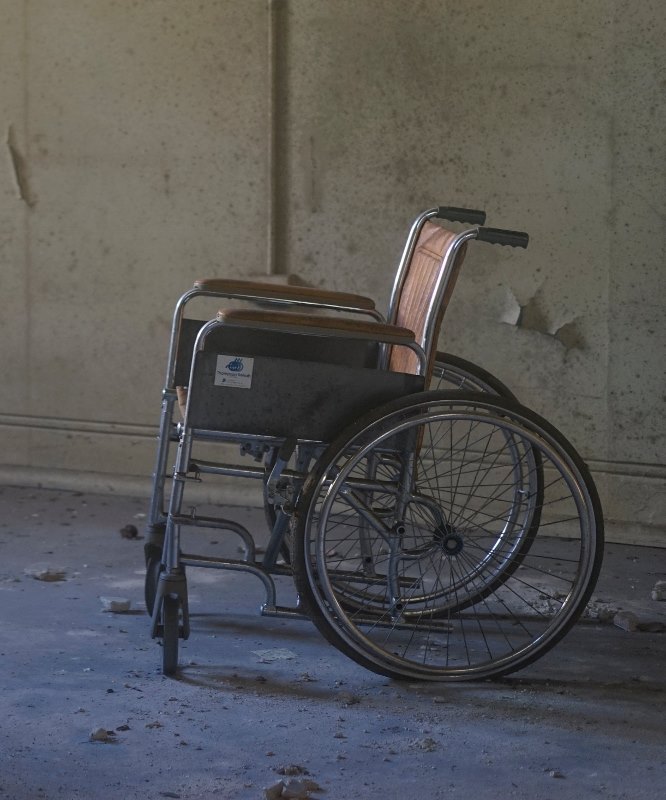
In the end I was waiting for a porter for about an hour. In this time, the frequency of vomiting attacks increased from once every 10-15 minutes, to once every 6-8 minutes. This is according to Julie. I have no idea. When I wasn’t throwing up, I was sitting with my eyes shut, trying to catch my breath and waiting for the next attack.
The porter finally turned up with a wheelchair that would’ve comfortably sat both me and Julie. Julie, however, didn’t seem inclined to try. So, off we went to the Medical Assessment Unit (MAU), pausing only briefly for me to violently vomit right next to a couple of patients who were trying to have a chat. They didn’t look thrilled.
By this stage, my vomiting was both very painful and, as a result, very loud. There were also a wide variety of high pitched squeaky noises being squeezed out of me. The like of which I’ve never heard before, or since.
Once in the MAU, we quickly discovered that gone 6 in the evening, just before a shift change, was not the time to be there. There was, however, a good supply of kidney bowls, which were a much better size for the amount of bile I was producing. After a while, someone even brought in a box of tissues…
Eventually, someone came and took my observations and asked what meditations I’d been given. To which I was able to reply, “Four white tablets and a larger yellow one at about 2pm, and a syringe and a half of something that I think started with ‘Cyclo’!”
Even in the state I was, it worried me that they were asking me what drugs I’d been given, instead of looking it up. By this stage, though, my vomiting was back down to once every 20-30 minutes. So, when the nurse came back and said that I couldn’t be issued any more meds without a visit from a doctor, but that I wouldn’t be able to see a doctor for ages, I asked to be discharged.
This resulted in a junior doctor arriving and advising me against it. I pointed out that I could barely hear her over the alarms from the machines in the beds around me and that I could throw up at home, just as easily as I could in hospital. It was obvious that there were people around me that actually needed help and I was just cluttering the place up.
So she got some forms, made me sign that I understood my leaving was against medical advise, told me to keep hydrated and let me go.

We got home at about 10pm. I showed the girls that I was okay, packed them off to bed and then promptly threw up the water I’d been sipping for the last hour. But that was it. That was the last time I vomited.
Julie made me a hot chocolate and that settled my stomach beautifully. Over the course of the next couple of hours, I was able to eat and drink more normally before finally going to bed. I slept well but my stomach ached for days afterwards. It was like I’d done a thousand sit ups. And I hate sit ups!
So, that was the first of my complications of chemotherapy. It started in the hospital and ended at home. But not all complications of chemotherapy go like this. My other started at home and ended in the hospital.
Some of the complications of chemotherapy aren’t as a direct result of the medication itself. They result from the side effects of the medication. In my case, this was immobility due to nausea.
Oh, on the note of side effects, I just remembered another one that I forgot to mention in my side effects post: the loss of my fingerprints. Nothing serious but so very strange. Also, it’s quite difficult to grip smooth things like drinks glasses, without fingerprints. But, I digress..
Half way through my second course of chemotherapy treatments, the second of my complications of chemotherapy put in an appearance. I’d had my 2 bags of Oxaliplatin on the 22nd December. This led to a somewhat subdued Christmas, with Capecitabine tablets on the menu. But them’s the breaks.
I was walking up stairs when I felt something weird happen in my right calf. Something gave way and I thought I’d pulled a muscle. But, by the time I’d got to the top of the stairs, there was no pain, so I shrugged it off.
A couple of days later was New Year’s Eve and we were all watching the start of the celebrations. Out of nowhere, I realised I was having difficulty breathing: I’m not the sharpest knife in the block. I was also running a temperature, so we called the hospital and they told me to report to the MAU. Oh, the joy!
After an ECG and a CT Scan, I was cheerfully informed that I’d had a Deep Vein Thrombosis (DVT) in my calf, which had then broken off and settled in my lungs. This had resulted in me developing bilateral pulmonary emboli and pleural effusion. Apparently this was nothing to worry about, very common and nothing a course of blood thinners wouldn’t solve. They’d keep me overnight, for observations, then send me home the following day.
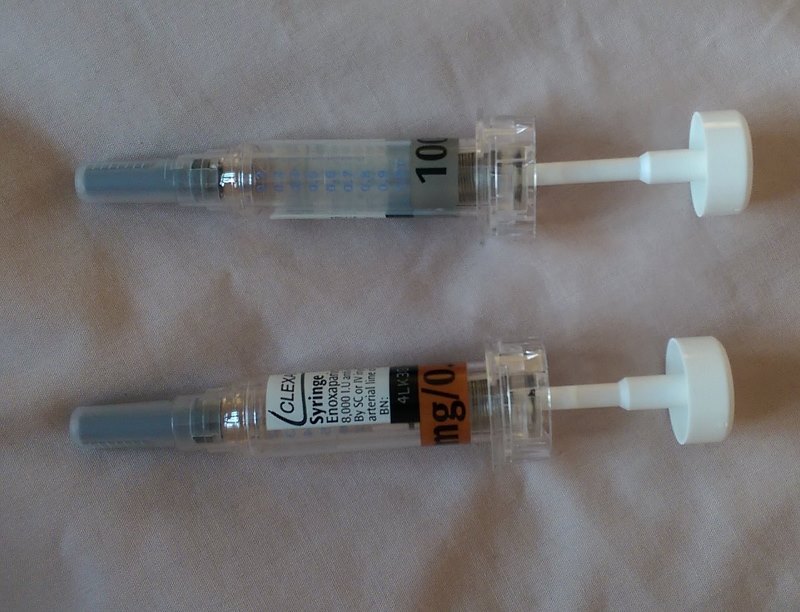
And that’s how I spent New Year’s Eve in the hospital. I spent part of New Year’s Day looking up some information about pulmonary emboli and it didn’t seem as benign as suggested. Quite a lot of deaths involved, actually. Best avoided, really. If you’re going through chemotherapy, and can’t keep yourself active, please do check for DVTs.
It’s also how I ended up having to stab myself in the belly with Clexane for the next few months. And again, for the duration of my second course of chemotherapy.
The reason I developed the DVT was the nausea brought on by the chemotherapy left me bed bound. In addition to the chemotherapy, by the time December rolled round, I’d also had a number of surgeries on my bowel and liver. All this added to my lack of mobility.
Both surgery and inactivity increase the risk of DVT. And about half of DVTs are asymptomatic. I certainly didn’t feel any pain from mine; I didn’t know it was there until it was gone.
One of the complications of the complications of chemotherapy is the mess the Clexane makes of your belly. Leaves it feeling quite sore, too.
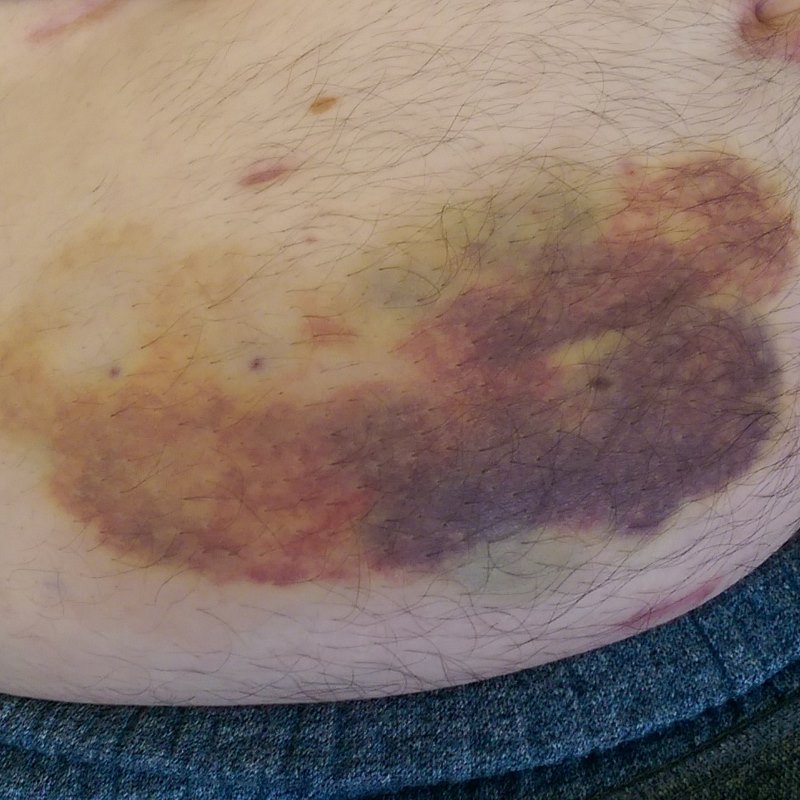
So these were my complications of chemotherapy. Both of them were quite scary at the time. But both were dealt with inside a day. To my mind, a worse complication is that of under-dosing, because it means that the patient isn’t getting enough of the medication for it to do its job.
And it may be that, after my overdose, this became the third of my complications with chemotherapy. In my case the Oxaliplatin and Capecitabine regime did very little to reduce my tumour. To the point that, following some complications with my surgeries, my bowel actually ruptured before the scheduled bowel resection.
I had been told, before the treatment started, that chemotherapy isn’t effective for everyone. This might very well be the case with me. But I do wonder whether 2 bags was enough to do the job and, after my overdose, if I was receiving an under-dose. The rate of infusion was slowed so the 2 bags took as long to go in as the 3. I wonder if trying the 3 bags at the slower rate of infusion might not have been worth trying.
There’s no way to know, at this point. And it really doesn’t matter. However, what I would say to anyone going through chemotherapy is to take as high a dose as you can handle. Yes it will hurt more, but it will also have a better chance of doing what it’s supposed to; shrinking tumours.
Believe me when I say; going through 6 months of chemotherapy, with all the associated side effects and complications, but getting little to no tumour shrinkage, is somewhat soul destroying. Avoid it if you can.
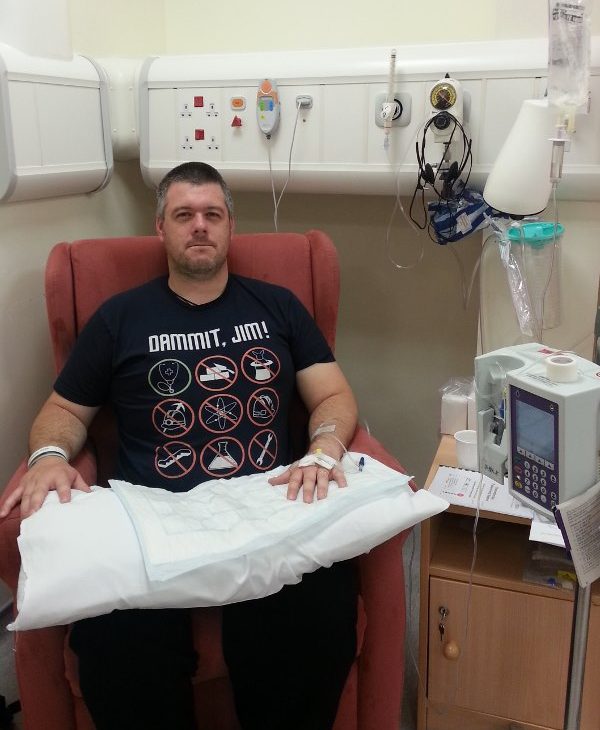
6 thoughts on “The Complications of Chemotherapy for Bowel Cancer”
Thank you for sharing your journey of being a patient facing cancer, chemotherapy, and all of the highs and lows which happen while going through treatments. Best wishes to you for a permanent remission and a long, healthy life. Thank you for sharing! One question, do you have any regrets regarding taking chemo? I’ve thought about being in that situation. I honestly am not sure if I would take it or not. I would undergo surgeries, for sure, but I am not so sure about the poisons known as chemo. I’m just curious as to your feelings about those drugs. Thank you! Again, best wishes and keep fighting the big C!
Hi Judy,
I’m glad you’re finding my posts interesting, and thank you for your kind words.
I completely understand your concerns regarding chemotherapy. It is a poison. One of mine was Oxaliplatin, which is Platinum based. It literally works by giving you heavy metal poisoning, on the understanding that the cancer cells suffer the most. Which, of course, they do. But that doesn’t mean that the rest of you isn’t suffering as well…
As to regrets about taking chemotherapy; the only one I have is that I wish I was more receptive to the first lot I took. There’s nothing that can be done about it, though, I’m just one of those people for whom that particular treatment isn’t very effective. For most people, it’s far more beneficial. Would I change anything about how I got my treatment? No. Next time I’m offered chemotherapy, I’ll take it.
The main reason for this is how well I responded to the chemotherapy I was given after I was moved to palliative care (I’ll put a link below). Sure, the first type of chemo didn’t help much, but the second type went above and beyond. I responded to the second type far better than average. Which is why I’m still alive, as opposed to otherwise.
But, I fully accept that chemotherapy is a complicated topic. There is so much information out there but it all boils down to, ‘Everyone responds differently to chemotherapy’. And I don’t think there’s a more unsatisfying answer than that in the world…!
I wrote a post about the pros and cons of chemo, which I think you’ll find interesting: http://www.cancerdad.co.uk/can-chemotherapy-cure-cancer/
There are also some posts about my experiences with palliative chemo, as I mentioned above, which start here: http://www.cancerdad.co.uk/palliative-chemotherapy-for-bowel-cancer/
Overall, my feelings about chemo are: I hate it, but; it’s a necessary evil.
I hope that makes sense.
All the best.
Paul
Very interesting
Many thanks.
Hi Paul,
My mom has been diagnosed with the same cancer. It’s adenocarcinoma. She’s responding well to the medicines, however, the side effects and complications from chemotherapy are really ugly. I would like to ask if the shortness of breath in your case also lead to sudden shooting up of blood pressure? Well that’s the case with my mom. She’s also receiving targeted chemotherapy alongside and on the 2nd and 3rd day of it, this complication occurs multiple times. If you have had any experience on how to cope with this, please do share. We ca discuss this with our doctor then. 🙂 hope you are doing well. And thank you for such nice articles that help us.
Hi Astha,
I’m so sorry for the long delay in replying, I’ve been struggling with depression, which has kept me off this site.
I’m sorry, too, to hear of your mother’s diagnosis and wish her a speedy recovery.
With regards to your mom’s complications, I’m not sure that I experienced the same thing.
I’ve just searched the journal I kept while I was undergoing treatment and there is no mention of me feeling short of breath or struggling with high blood pressure. To be fair, though, nausea pretty well confined me to bed for the duration of my chemotherapy treatments, so I didn’t have an opportunity to get breathless. I don’t know if your mom is able to remain active but I’m pretty sure that had I tried to be active, breathlessness would have quickly followed. As such, my only suggestion would be that if your mom is being active, to try and get her to put her feel up for a bit.
I’m sorry that I’ve got nothing useful to contribute. That said, I’ve now gone 4 years without needing treatment, so there definitely is a way through this.
My regards to you and your mom,
Paul